Garnished with chic designs and with a far-reaching menu aiming to update Chinese cuisine, Bird Wo Wo clearly wants to broaden the appeal of the culinary traditions of China. And if the customer demographic observed on a recent visit is of any indication, the establishment woos an international and young crowd. Its offerings, however, are hit and miss.
First-time diners could be forgiven for confusing the Chinese restaurant with a cafe intended to titillate a female clientele. Brightly lit, the interior has a sleek color scheme of iron gray and white, adorned with decorative, feather-shaped patterns, mirrors and hanging ornaments made of beads. Those who wish to snap selfies and shout “How cute!” (好可愛) amid young women and girls might be disappointed though. On the weekday evening my dining partners and I visited, the majority of the diners appeared to be youngish white-collar workers. A cacophony of languages was also heard. Next to our table, a group of Japanese-speaking, suit-wearing businessmen seemed to enjoy their meals with bottles of Taiwan beer (NT$150 per bottle). On the other side, several men and women with Singaporean accents discussed work over glasses of red wine.
As for the food, the restaurant’s kitchen is designed to appeal to as many customers as possible, covering various regional cuisines ranging from Jiangsu and Zhejiang to Szechuan and Cantonese. Traditional dishes are often given an innovative twist. The boiled sliced pork and cucumber with garlic sauce (爽口薄片晾衣, NT$290), for example, is a creative rendition of boiled pork with garlic sauce (蒜泥白肉), a staple plate of the Szechuan cuisine. The photogenic dish offered a surprisingly savory explosion of flavors in the mouth, mixing the thin slices of fat-streaked pork, the freshness of cucumbers with the thick dipping sauce of garlic and honey. It was our favorite course of the evening.
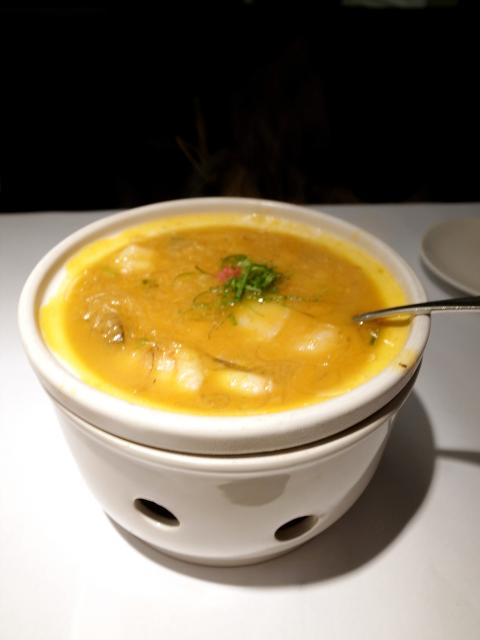
Photo: Ho Yi, Taipei Times
Another innovative attempt is the shaoxing millet bread with deep fried dry vegetables (紹興干菜窩窩頭, NT$320). Composed of preserved vegetables deep fried with pork and wrapped in brown sugar-flavored mantou (饅頭), or steamed buns, the dish was a saliva-inducing balance between the crispy, salty filling and the sweet, soft bun. The outer parts of the buns, however, were disappointingly soggy and left a blemish to the otherwise fun creation.
Recommended by our wait person, the braised dry pig skin with stinky tofu (美極皮肚臭豆腐, NT$360) didn’t impress with the less-than-ordinary quality of tofu, and the portion was skimpy for the price. Nor were we particularly enthusiastic about the braised crab roe with seafood and green bean noodle in casserole (蟹黃海鮮粉絲煲, NT$380), which was bland and dominated by sticky noodles.
Other popular dishes include deep-fried balsam pear (不像苦瓜, NT$280), deep-fried shrimp balls (灌湯黃金蝦球, NT$380), stewed pork with cabbage and eggs (提督官府燉菜, NT$380) and the chef special in casserole (宮廷一品皇罈子, NT$250), which features scallops, pig knuckle and king oyster mushrooms.
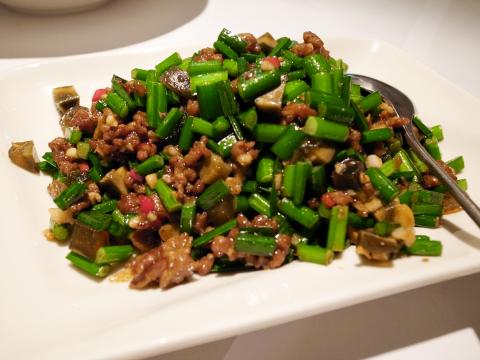
Photo: Ho Yi, Taipei Times
Surprisingly, the restaurant also has a small afternoon-tea menu filled with waffles, sandwiches, chocolate drinks and even a chocolate fondu. Why this Chinese restaurant wants to sell coffee and cake is anyone’s guess, but the Western-style offerings feel like an afterthought and might stretch the establishment’s creativity a bit too much.
Bird Wo Wo has several other venues — Neihu (內湖) and Tamsui (淡水) districts as well as in Greater Taichung and Greater Kaohsiung. For more information, visit the restaurant’s Web site at www.birdwowo.com.
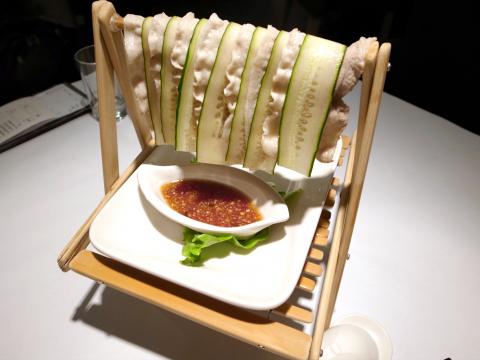
Photo: Ho Yi, Taipei Times
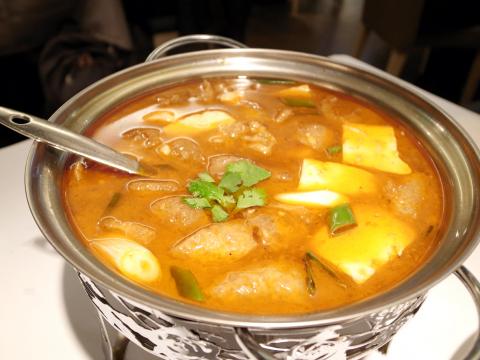
Photo: Ho Yi, Taipei Times
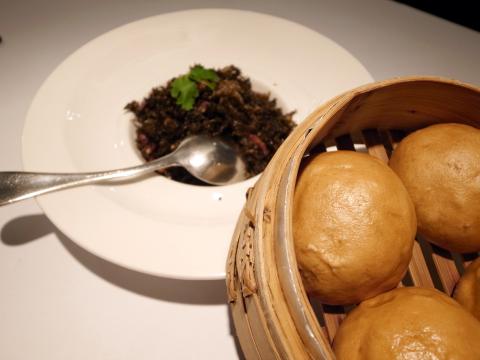
Photo: Ho Yi, Taipei Times

Growing up in a rural, religious community in western Canada, Kyle McCarthy loved hockey, but once he came out at 19, he quit, convinced being openly gay and an active player was untenable. So the 32-year-old says he is “very surprised” by the runaway success of Heated Rivalry, a Canadian-made series about the romance between two closeted gay players in a sport that has historically made gay men feel unwelcome. Ben Baby, the 43-year-old commissioner of the Toronto Gay Hockey Association (TGHA), calls the success of the show — which has catapulted its young lead actors to stardom -- “shocking,” and says

The 2018 nine-in-one local elections were a wild ride that no one saw coming. Entering that year, the Chinese Nationalist Party (KMT) was demoralized and in disarray — and fearing an existential crisis. By the end of the year, the party was riding high and swept most of the country in a landslide, including toppling the Democratic Progressive Party (DPP) in their Kaohsiung stronghold. Could something like that happen again on the DPP side in this year’s nine-in-one elections? The short answer is not exactly; the conditions were very specific. However, it does illustrate how swiftly every assumption early in an

Inside an ordinary-looking townhouse on a narrow road in central Kaohsiung, Tsai A-li (蔡阿李) raised her three children alone for 15 years. As far as the children knew, their father was away working in the US. They were kept in the dark for as long as possible by their mother, for the truth was perhaps too sad and unjust for their young minds to bear. The family home of White Terror victim Ko Chi-hua (柯旗化) is now open to the public. Admission is free and it is just a short walk from the Kaohsiung train station. Walk two blocks south along Jhongshan

Jan. 19 to Jan. 25 In 1933, an all-star team of musicians and lyricists began shaping a new sound. The person who brought them together was Chen Chun-yu (陳君玉), head of Columbia Records’ arts department. Tasked with creating Taiwanese “pop music,” they released hit after hit that year, with Chen contributing lyrics to several of the songs himself. Many figures from that group, including composer Teng Yu-hsien (鄧雨賢), vocalist Chun-chun (純純, Sun-sun in Taiwanese) and lyricist Lee Lin-chiu (李臨秋) remain well-known today, particularly for the famous classic Longing for the Spring Breeze (望春風). Chen, however, is not a name